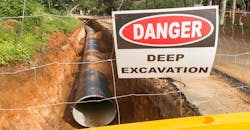Construction Company Owner Charged with Manslaughter Over Worker's Trench Death
Phillip Numrich, the owner of Seattle-area Alki Construction, was charged Jan. 5 with felony manslaughter following an investigation of the death of an employee in a collapsed trench two years ago.
The King County Prosecuting Attorney’s Office filed second-degree manslaughter charges against Numrich in connection with the death of Harold Felton. Felton was killed when the dirt walls of the trench he was working in collapsed and buried him on a job site in West Seattle.
“There are times when a monetary penalty isn't enough,” said L&I Director Joel Sacks. “This company knew what the safety risks and requirements were, and ignored them. The felony charges show that employers can be held criminally accountable when the tragedy of a preventable workplace death or injury occurs.”
After a state Department of Labor & Industries (L&I) investigation of the death, the state cited and fined the company in 2016 for multiple workplace safety violations, including “willful” violations − the most severe. The original fines totaled $51,500.
The company had dug trenches next to a Seattle home to replace a sewer line. The trench where the worker died was seven-feet deep and just under two-feet wide. There was no system in place to prevent all sides from caving in.
Excavation and trenching are known to be very hazardous, so there are numerous safety requirements that must be followed, including ensuring that sites four-feet deep or more have protective systems in place to prevent the dirt sides from caving in.
Among other requirements, employers also must make sure there are ladders, ramps or other ways available to safely exit an excavated trench. In addition, there must be daily inspections of excavations to monitor changing soil conditions. Alki violated these and other workplace safety requirements, according to L&I.
"A workplace death affects families forever," Sacks added. "When workplace safety and health laws are followed on the job, nearly every incident like this can be prevented. When they're ignored, the results are often disastrous and irreversible."
About the Author

Sandy Smith
Sandy Smith is the former content director of EHS Today, and is currently the EHSQ content & community lead at Intelex Technologies Inc. She has written about occupational safety and health and environmental issues since 1990.
